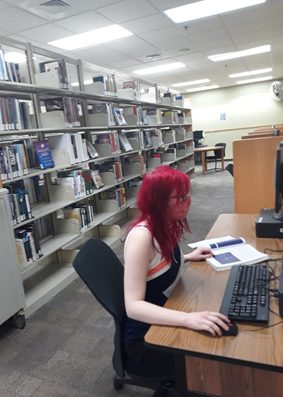By Hannah Dunbar
Courses went online last year due to the pandemic. Some students love it while others along with faculty found it more difficult.
The majority of classes College of Southern Nevada offered spring term are online. The upcoming fall term is yet to be determined but likely will be held online except for a few exceptions like nursing that require hands-on instruction on campus.
According to a survey titled “Suddenly Online: A National Survey of Undergraduates During the COVID-19 Pandemic” by the Digital Promise Report with Langer Research Associates, college students were asked how satisfied they were with their classes before and after the transition to online. It showed 59% of students were satisfied compared to 51% of students before the transition. What this means is satisfaction went up when students had the chance to take online courses.
Brandon Johnson, CSN student, said, “Online classes have helped me improve my grades. In online classes, I feel that I have more control over my grade and can produce better quality work.”
Jennifer Schmidley, a CSN student, said that she is doing very well this semester. “It is nice to be able to take classes online that are normally only held at other campuses.”
“As someone who has always worked full time while going to school, I’ve always preferred online classes over in-person ones,” said Annelise Friedman, a student at CSN. “Online classes have benefited me by giving me the time and freedom to complete my schoolwork according to my own schedule and on my own terms.”
She added it is not perfect for every course she takes. She has a legal-research class this semester that she thinks is more difficult and wishes it was in-person. “Legal research is a discussion-oriented class and because it’s online that element is removed.”
Some students and faculty found online classes harder.
According to the study noted above, 43% of students did not take any online courses before the pandemic making the learning curve sharp. To help with the transition many colleges and universities changed their grading policies by extending the time period for withdrawing or auditing a class. CSN did that.
Dondi Browner, who teaches psychology at CSN, said, “I absolutely saw students’ grades drop particularly during the transition in the spring semester of 2020. It was an unprecedented time of chaos and every aspect of our students’ lives were affected. It was a very difficult time for everyone, but we reorganized and worked together and finished with a very successful semester.”
“I prefer in-person classes because I am an experiential instructor; however, I believe both can be done successfully,” Browner added.
“I do not consider myself tech-savvy,” Browner said. “I have found technical difficulties to be the most frustrating part of online teaching, particularly internet problems, which are completely out of our control. However, I have never had a technical difficulty adversely affect a student’s grade.”
There are some students who do not have access to internet at home or don’t have computers. Video conferencing can be a major problem for students and professors due to connection since that requires high bandwidth. One benefit with online classes is that some professors will record lectures that students can watch on their own time later.
Fortunately, the CSN Libraries are open as well as the computer labs so students without access to internet can work on assignments.





